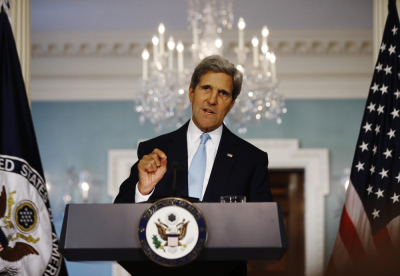Will America and Russia Talks on Syria Fall Apart?

Russia is unlikely to agree to a provision that would allow military force to be used should Syria not keep its word and fully hand over its chemical weapons according to an agreed timetable, the Obama administration has said on Friday.
The news comes as President Barack Obama, in a speech this week, refused to close off the American option of using force. However, Russia's stance remains in line with Syrian President Bashir Al-Assad's comments made earlier this week demanding that the United States take any potential attack off the table before he turn over his chemical weapons.
Two days of "constructive" talks have been held between U.S. Secretary of State John Kerry, and Russian Foreign Minister Sergey Lavrov, regarding the details of a plan under which Syria would turn over its chemical weapons.
Kerry indicated that it is likely he and Lavrov will meet later this month in New York City to finalize a proposal.
"We both agreed to do that homework and meet again in New York around the time of the U.N. General Assembly in order to see if it is possible then to find a date for that conference, much of which will obviously depend on the capacity to have success here in the next days," said Kerry.
Even if an agreement on the transfer of chemical weapons is confirmed, it is highly unlikely to result in peace in Syria, and the nation's brutal civil war will likely continue. However, even finding an agreement to address the chemical weapons issue is a huge challenge with many diplomatic and logistical roadblocks.
Earlier this week, BBC Moscow Correspondent Daniel Sandford argued that trying to seize chemical weapons in the middle of a civil war would be close to impossible.
"You have to get these international experts into Syria in the middle of a civil war, and then you've got to try and keep them safe, around the areas where the chemical weapons are," said Sandford. "And then you've got to persuade the Syrians to go along with this idea of destroying the weapons, because at the moment the Russian plan involves destroying the weapons whereas the Syrian government does not seem to have quite signed up for that."
Another concern for officials is ensuring that weapons do not end up in the wrong hands.
Earlier this week, Syria formally applied to join the international chemical weapons ban, a move that Russian Presidnet Vladmir Putin hailed as "an important step towards the resolution of the Syrian crisis."
"This confirms the serious intention of our Syrian partners to follow this path," he added.
That Syria takes the negotiations seriously, has been a point Kerry has driven home during the negotiation process. On Thursday, he slammed the Assad administration's alleged proposal that they would submit information on its chemical weapons within a standard 30 days from any agreement being reached.
"There is nothing standard about this process," Kerry said. "This is not a game. It has to be real. It has to be comprehensive. It has to be verifiable. It has to be credible. It has to be timely and implemented in a timely fashion. And finally there ought to be consequences if it doesn't take place."
To back up those statements, President Obama said on Friday, "[Assad] has committed many crimes against humanity, and therefore I am sure there will be surely a process of accountability when everything is over."
Beyond the chemical weapons that the U.S. has alleged the Syrian government has used, earlier this week the U.N. released a report accusing Syrian government forces of committing war crimes by bombing and shelling hospitals to prevent wounded people from getting medical attention.
"The pattern of attacks indicates that government forces deliberately targeted hospitals and medical units to gain military advantage by depriving anti-government armed groups and their perceived supporters of medical assistance," the report said.
The U.N. reports also indicated that it had evidence of a smaller number of instances of rebels attacking hospitals and said that medical centers had begun to be attacked starting in 2012.
The report gave examples of Syrian security forces positioning snipers on the roof firing on would-be hospital visitors in Deera. The hospitals have been exposed to constant shelling, with many doctors and patients being killed, and operations and many treatments having to take place "in the basements of houses" rather than medical facilities.
Currently, over 100,000 people have died since 2011 and more than 2 million Syrians are refugees.




























